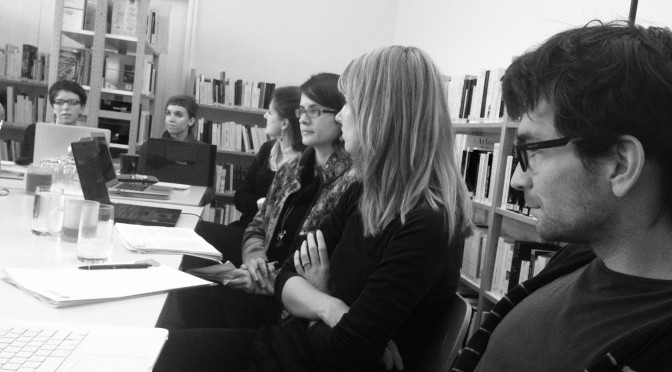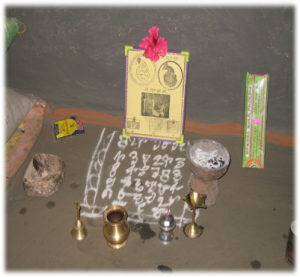The IMS-CEFRES seminar “Between Areas and Disciplines” will host
Martin MICHELOT (FSV UK)
who will present his work on
“Regional Security Cooperation Arrangements in Europe: Building Europe, Strengthening Transatlantic”
The presentation will be discussed by Tomaš Weiss PhD. (IMS FSV).
The seminar will be held in English.
Serge LUSIGNAN (Université de Montréal) will hold two lectures (in French):
9 h 10 – French, Latin and English: Oral and Written Communication in England During the Fourteenth and Fifteenth Centuries
10 h 50 – On Paris University’s Treshold: French Language in the University Milieu
Franco-Czech Seminars in History are co-organized by the Faculty of Arts of Charles University in Prague in collaboration with CEFRES. Continue reading Franco-Czech Seminar in History →

Convener: Filip Vostal (CEFRES & FLÚ AV ČR).
Language: English.
Venue: CEFRES, Štěpánská 35, 5th floor.

Cécile GUILLAUME-PEY (CEFRES fellow, Center of Social Anthropology in Toulouse (CAS-LISST)) will hold a lecture (in French):
From Spirit to Letter. Modes of Appropriating Script among Tribal Groups in India
Venue: Faculty of Arts – room 201 (náměstí Jana Palacha 2, Prague 1) at 10:50 AM.
Franco-Czech Seminars in history are co-organized by the Philosophy Faculty of Charles University in Prague in collaboration with CEFRES. Continue reading FRANCO-CZECH SEMINAR IN HISTORY →
For the first session of our monthly research seminar,
Between Disciplines and Areas
Dr. Lucia NAJŠLOVÁ (FSV UK) will present her current research on the following topic:
Beyond Occidentalism
the Politics of Belonging in EU-Turkey Relations
Venue : Faculty of Social Sciences, Rytířská 31, room 201, 22.10.2015, 5 pm
This seminar is coorganized by CEFRES and the Institute for International studies of the Faculty of Social Sciences (Charles University of Prague)
Contact: paul.bauer@fsv.cuni.cz & clararoyer@cefres.cz

Centre d’histoire et de théorie de la sociologie et le CEFRES vous invitent à la conférence-débat
Transformation, dégradation, perte des objets scientifiques
La conférence principale « De la disparition des objet de science » sera prononcée par le Professeur Olivier Clain (Université Laval à Québec).
Depuis près d’un demi-siècle, l’histoire des sciences s’est affranchie du schème d’un progrès linéaire qui mènerait les hommes de science de découverte en découverte. Ainsi, au moment de leur introduction dans le discours scientifique, les concepts de paradigme et de révolution scientifique, tout comme celui d’épistémè, par exemple, ont témoigné de la nouvelle attention portée aux ruptures qui affectent l’histoire des savoirs. Or, à l’encontre des « inventions », des « constructions » ou des « généalogies » qui figurent aujourd’hui encore au cœur de la plupart des travaux, et donc contre la préférence ainsi manifestée pour le versant « constructif » de l’histoire, nous souhaitons attirer l’attention sur un phénomène moins abordé, pour ne pas dire négligé, celui des « disparitions ».
Disparition n’est pas absence. Autrement dit on peut poser un certain nombre de questions relatives à la disparition des objets de savoir qui se manifestent dans l’histoire des disciplines : comment le savoir abandonne-t-il ses objets et que devient « le site » qui leur donnait consistance, à savoir les solutions aux problèmes et les questions dont ils étaient les témoins? Quelles traces les objets scientifiques eux-mêmes laissent-ils et quels retours opèrent-ils éventuellement? Existe-t-il une logique de la disparition qui renvoie à la structure du réel lui-même? Ces questions revêtent peut-être une importance particulière pour des disciplines dans lesquelles les grandes ruptures et les révolutions scientifiques sont difficiles à repérer, comme c’est le cas pour les sciences sociales.
Langue : français.
Lieu : CEFRES, Štěpánská 35, 5e étage.
Pour tout renseignement, contacter Jan Maršálek: jan.marsalek@fsv.cuni.cz



